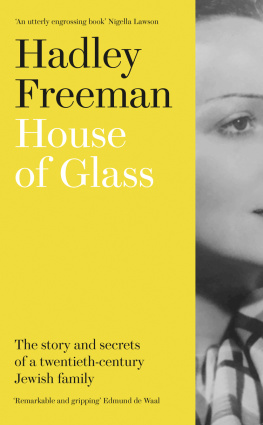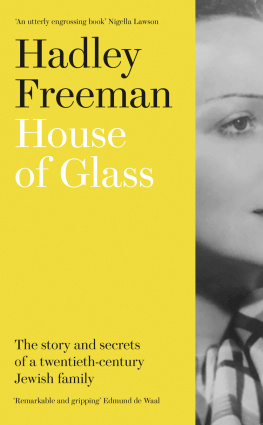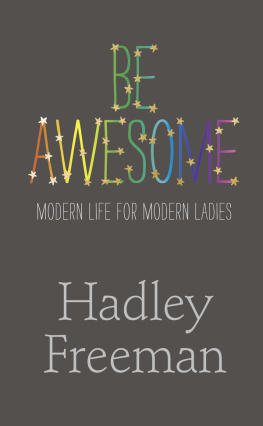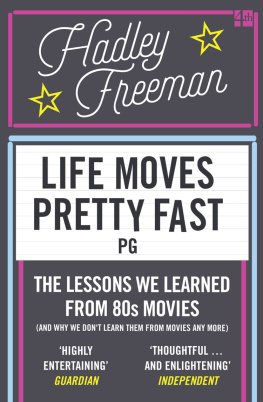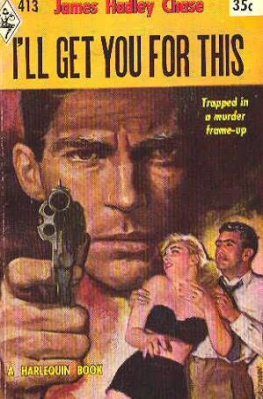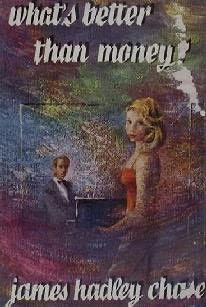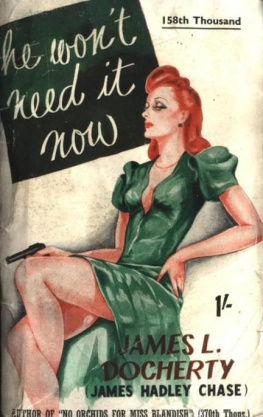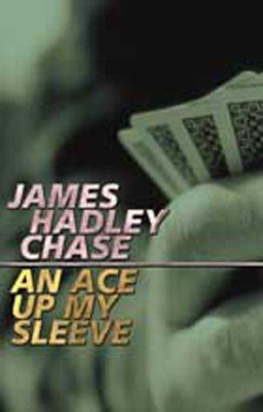Thank you for downloading this Simon & Schuster eBook.
Join our mailing list and get updates on new releases, deals, bonus content and other great books from Simon & Schuster.
C LICK H ERE T O S IGN U P
or visit us online to sign up at
eBookNews.SimonandSchuster.com
We hope you enjoyed reading this Simon & Schuster eBook.
Join our mailing list and get updates on new releases, deals, bonus content and other great books from Simon & Schuster.
C LICK H ERE T O S IGN U P
or visit us online to sign up at
eBookNews.SimonandSchuster.com

Simon & Schuster Paperbacks
An Imprint of Simon & Schuster, Inc.
1230 Avenue of the Americas
New York, NY 10020
www.SimonandSchuster.com
Copyright 2015, 2016 by Hadley Freeman
An earlier edition of this work was published in Great Britain in 2015.
All rights reserved, including the right to reproduce this book or portions thereof in any form whatsoever. For information, address Simon & Schuster Subsidiary Rights Department, 1230 Avenue of the Americas, New York, NY 10020.
First Simon & Schuster trade paperback edition June 2016
SIMON & SCHUSTER PAPERBACKS and colophon are registered trademarks of Simon & Schuster, Inc.
For information about special discounts for bulk purchases, please contact Simon & Schuster Special Sales at 1-866-506-1949 or .
The Simon & Schuster Speakers Bureau can bring authors to your live event. For more information or to book an event, contact the Simon & Schuster Speakers Bureau at 1-866-248-3049 or visit our website at www.simonspeakers.com.
Interior design by Ruth Lee-Mui
Cover Design by Anna Laytham
Library of Congress Cataloging-in-Publication Data
Names: Freeman, Hadley.
Title: Life moves pretty fast : the lessons we learned from eighties movies (and why we dont learn them from movies anymore) / Hadley Freeman.
Description: First Simon & Schuster trade paperback edition. | New York :
Simon & Schuster, 2016. | Includes bibliographical references and index.
Identifiers: LCCN 2015048387 (print) | LCCN 2016000145 (ebook)
Subjects: LCSH: Motion picturesUnited StatesHistory20th century. |
Motion picturesSocial aspectsUnited StatesHistory20th century. |
BISAC: PERFORMING ARTS / Film & Video / History & Criticism. | BIOGRAPHY &
AUTOBIOGRAPHY / Personal Memoirs. | HISTORY / North America.
Classification: LCC PN1993.5.U6 F75 2016 (print) | LCC PN1993.5.U6 (ebook) |
DDC 791.430973/09048dc23
LC record available at http://lccn.loc.gov/2015048387
ISBN 978-1-5011-3045-8
ISBN 978-1-5011-3066-3 (ebook)
For Andy, who is even better than Andrew McCarthy, Michael J. Fox, Matthew Broderick, Eddie Murphy, Bill Murray, and Dan Aykroyd.
Combined.

Contents


Introduction

Whatever happened to chivalry? Does it only happen in eighties movies? I want John Cusack holding a boom box outside my window. I wanna ride off on a lawn mower with Patrick Dempsey. I want Jake from Sixteen Candles waiting outside the church for me. I want Judd Nelson thrusting his fist into the air because he knows he just got me. Just once, I want my life to be like an eighties movie, preferably one with a really awesome musical number for no apparent reason. But no, no, John Hughes did not direct my life.
I am not actually quoting myself here, though heaven knows I could be (except for the part about wanting the moronic Jake from Sixteen Candles , for reasons that shall be explained soon enough). That monologue comes from the film Easy A , which was released in 2010, and is spoken by Olive, played by Emma Stone, an actress who was born years after most of the movies her character mentions came out. Two years after Easy A was released, Pitch Perfect arrived and, once again, a film made thirty years earlier was the inspiration and crucial plot point for a twenty-first-century teen film: Were massive fans of John Hughes. We wanted to make a record [that] was almost a soundtrack to our teenage years. If he made a movie about us, this would be the soundtrack. Their lead singer was born in the nineties.
I was born in New York City in 1978, meaning that, while I did exist in the eighties as more than a zygote, I wasnt yet a teenager, either. Instead, actual teenagehood for me felt as distant and desirable as the moon. I was a typical older child from a middle-class Jewish family: well behaved, anxious, bookish, and therefore especially curious about the vaguely imagined freedoms I imagined being a teenager would bring. My little sister and I werent allowed to watch television stations that showed commercialsyes, I come from one of those familiesmeaning that our viewing options were limited to Sesame Street and whatever our mother allowed us to rent from East 86th Street Video. When I was nine years old, she, for the first time, allowed me to rent something that neither featured animation nor starred Gene Kelly: Ferris Buellers Day Off . I couldnt believe it. How on earth could shethe dorkiest mother EVER, who only ever gave us FRUIT for dessert, I mean I ask youlet me watch such a film? This movie featured BOYS, actual real-life BOYS! Kissing girlswith their tongues! Within the extremely limited framework of my life experience on the Upper East Side in Manhattan, my mother had basically allowed me to rent hard-core porn (tongues!).
Ferris proved to be a mere gateway drug, and I became such a heavy user of East 86th Street Video that for my tenth birthday my parents gave me my own membership card. I was soon mainlining the classics: Mannequin ; Romancing the Stone ; Good Morning, Vietnam ; The Breakfast Club ; Short Circuit ; Indiana Jones ; E.T. ; Spaceballs ; Coming to America ; Three Amigos! ; Planes, Trains and Automobiles ; anything produced by Touchstone Pictures, and absolutely everything featuring the two actors who I assured my little sister were the real talents of our era: Steve Guttenberg and Rick Moranis. My highbrow taste, which has lasted all my life, was forged then.
These movies, which were largely seen as junk when they came out, were deeply formative, and everyone I know in my generation feels exactly the same way. They provided the lifelong template for my perceptions of funniness (Eddie Murphy), coolness (Bill Murray), and sexiness (Kathleen Turner). They also taught me more about life than any library or teacher ever would. My parents could have saved literally thousands of dollars, jacked in the schools, and kept the membership to East 86th Street Video and Id still be essentially the same person today.
But for a long time, these films had a terrible reputation, critically speaking. They wereand largely still aredismissed as being as drecky as Ray, Egon, Winston, and Peter at the beginning of the Ghostbusters sequel. Sold out and bloated, something faintly embarrassing from the past that has left an ugly legacy of franchises and superheroes. Eighties Hollywood, goes the popular critical thought, is when movies started to go wrong: they became obsessed with money and sequels and explosions and cheap gags as opposed to Art. Whereas the far more respected 1970s was the era of the auteur, when Hollywood directors like Robert Altman and Michael Cimino were allowed to pursue their creativity unhindered by studio meddling, the 1980s was the era of the producer, when entertainment took precedence and cartoonish figures like creepy Don Simpson and Jon Peterswho started his career as Barbra Streisands hairdresserwere the ones with the power.
Next page

